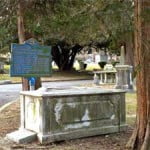This Day in Presbyterian History:
The First Governor of Delaware
 The first governor, or at that time called the president of Delaware, was a Presbyterian physician in Wilmington, Delaware. Born on February 21, 1721 in Ulster, Northern Ireland, John McKinly came to Delaware in 1742. While his education and particularly his medical background is hard to trace, nonetheless he soon became a popular physician in Wilmington. Marrying Jane Richardson, they both became prominent members of the Presbyterian Church.
The first governor, or at that time called the president of Delaware, was a Presbyterian physician in Wilmington, Delaware. Born on February 21, 1721 in Ulster, Northern Ireland, John McKinly came to Delaware in 1742. While his education and particularly his medical background is hard to trace, nonetheless he soon became a popular physician in Wilmington. Marrying Jane Richardson, they both became prominent members of the Presbyterian Church.
He served any number of city, county and state offices, until he was elected by the General Assembly to become the first governor of the Delaware colony. The fact that he was from Ulster, and thus a Scot-Irish Presbyterian, made him acceptable to the Presbyterians from New Castle County. However, the fact that he was a moderate and not entirely in favor of independence from Great Britain, made him popular with the Anglicans from Kent and Sussex County in Delaware. This background, while a good compromise in political circles, did not save him from being captured by the British after the Battle of Brandywine. He would be a prisoner of war until 1778, when he was exchanged for the royalist son of Benjamin Franklin.
 After that experience, even with promises of support, he never entered politics again. He died August 31,1796, and was buried in the Presbyterian cemetery.
After that experience, even with promises of support, he never entered politics again. He died August 31,1796, and was buried in the Presbyterian cemetery.
‹ Governor McKinly’s gravesite, in the Brandywine cemetery.
Words to live by: The only reference we have to him being a Presbyterian is the statement that he was “a prominent Presbyterian.” That can mean almost anything and have very little to do with his spiritual testimony. Usually, in those days, a person couldn’t be buried in the Presbyterian cemetery unless they were members in good standing in a Presbyterian church. And people who joined the membership of a Presbyterian church in colonial times had to have a credible profession of faith in Jesus Christ coupled with a credible profession of faith by their works. So arguing from the latter to the former, we can hope at least that his was a genuine faith with a conviction of Presbyterian doctrine, government, and life.
Through the Scriptures: 2 Chronicles 1 – 3
Through the Standards: Proof texts of religious worship in general:
Philippians 4:6
“Do not by anxious about anything, but in everything by prayer and supplication with thanksgiving let your requests by made known to God.” (ESV)John 14:13, 14
“Whatever you ask in my name I will do, that the Father may be glorified in the Son. If you ask anything in my name, I will do it.” (ESV)Romans 8:26
“Likewise the Spirit helps us in our weakness. For we do not know what to pray for as we ought, but the Spirit himself intercedes for us with groanings too deep for words.” (ESV)

